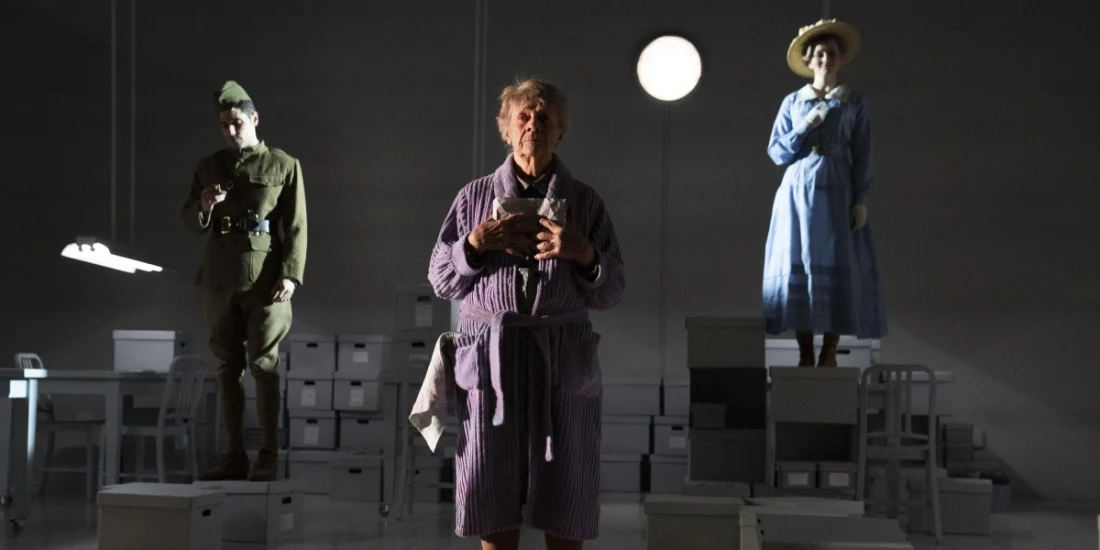Review of Unknown Soldier at Playwrights Horizons
When the composer/lyricist Michael Friedman died, in 2017, at age 41, he left behind a trove of musicals, some more finished than others. His biggest hit, Bloody Bloody Andrew Jackson, brought a blazing emo rock intensity to the Battle of New Orleans. Conversely, Playwrights Horizons' new staging of Unknown Soldier brings recitative and forlorn ballads to World War One. With the book and additional lyrics by Daniel Goldstein, and haphazardly directed by Trip Cullman, this production of a work that has been kicking around in various versions since 2008 has its heart in the right place, but the pulse is weak.
The centerpiece of Mark Wendland's ash gray scenic design is an illuminated clock with no hands, a tip off that time is fluid in this story that is set in 1918-1920, 1973, 2003, and 2013. The title character is not so much the center of attention as he is the catalyst for a series of slow moving events that transform three very lonely and plain people into three somewhat less lonely and plain people; which is to say that there is just not a lot at stake here, resulting in tranquility where there should be pathos.
Scene One is set in 1973 as 11-year-old Ellen (a coy Zoe Gluck) questions her grandmother, Lucy, about a 1920 photograph that shows her sitting under a tree with a soldier. Speaking of fluid time, that granny is played by 92-year-old Estelle Parsons, truly ageless, and charismatic as ever. Jump cut to 2003 and grown-up Ellen (Margo Seibert), now an OB-GYN in an unhappy marriage, rediscovers the photo in the recently deceased Lucy's home in Troy, New York. Attempting to shake off her low-level depression, she decides to try and figure out just who the mystery man is.
Ellen solicits the help of Andrew (Erik Lochtefeld), a university librarian in Ithaca who checks all the boxes of that stereotype: bespectacled, nerdy, disheveled and lonely. Ellen and Andrew have flirtatious email conversations, unimaginatively staged, and sing about the pleasures of their respective towns (Spoiler alert: there aren't many.). Meanwhile, in 1918, the story behind the old photo begins to unfold. A young, beautiful and somewhat delusional Lucy (Kerstin Anderson) carries on with Francis (Perry Sherman), an amnesia-stricken soldier, convinced he's the man for her.
Despite a perfectly adequate stage floor, Cullman sometimes has his actors standing on tables. That is one way to elevate a performance, but it proves distracting. The cast sings beautifully, especially Seibert with her deep timbre and Anderson with her strong soprano. But Friedman's melodies are busy backing all the narrative that needs to be laid out and rarely shine through. Lyrically, adult Ellen gets the best numbers as she comes to grips with her reality. She sings a likable parable after Andrew asks her out ("If it were only just a milkshake/Without all the stuff that happens next."), and a powerful self-examination of her career choice called "I Give Away Children" ("Every year I get older/And they stay the same."). The night's most upbeat ditty is a misconceived patter song about the three types of amnesia ("There's the kind called Retrograde/where only older mem'ries fade.") that risks turning a merely disappointing evening into one you wish you could forget.
(Photo by Joan Marcus)
WHAT THE OTHER CRITICS SAID
"Love is a beautiful liar in Unknown Soldier, Daniel Goldstein and Michael Friedman's gentle musical reverie on the deceptions of Eros and memory. Old-fashioned, mellifluous songs of courtship and marital bliss float beguilingly through Trip Cullman's carefully assembled production, which opened at Playwrights Horizons on Monday night."
Ben Brantley for New York Times
"It's a compelling story, amplified by some of Friedman's most soaringly romantic melodies — which are well sung and occasionally supplemented by catchier music-hall-style tunes, like a comic detour into various types of amnesia that serves as a break from the more serious tone that otherwise dominates the 90-minute, intermissionless production."
Thom Geier for The Wrap
Originally published on
